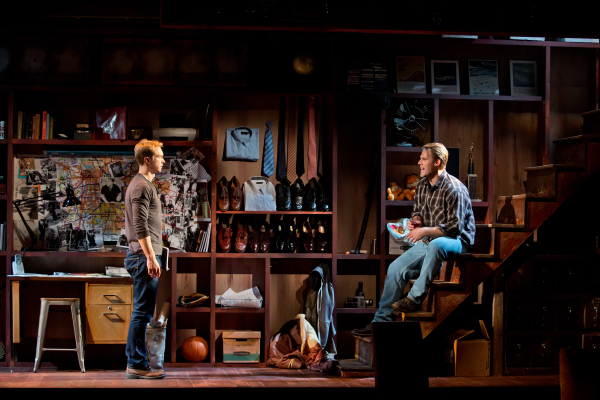Stalking the Bogeyman
David Holthouse’s real-life tale of sexual assault and attempted murder gets a staging off-Broadway.

(© Jeremy Daniel)
Deep below midtown Manhattan, Theater 5 of New World Stages has been transformed into a 1970s suburban basement. A bright orange armchair sits strategically downstage of the cheap wooden shelves that occupy every wall. Those shelves are cluttered with Star Wars figurines, old trophies, and cassette tapes. Stage right, a pilfered "neighborhood watch" sign stands sentry over the room. It's the kind with a red mark barring entry to a shadowy stranger wearing a broad black hat and cloak. Stalking the Bogeyman is not about that kind of villain.
It's based on journalist David Holthouse's startling confession in the pages of Westword that as an adult, he seriously planned to kill the man who raped him when he was seven years old. His rapist wasn't a stranger in a trench coat offering candy from his car window, but the teenage son of a family friend. This faithful (yet overly simplified) stage adaptation rests on an uncomfortable truth: Sexual violence is much likelier to come from a friend or family member.
In fact, the authenticity of Holthouse's original story struck such a nerve that it was picked up for a segment on the radio program This American Life, which is how director Markus Potter first discovered it. His stage adaptation (which features additional writing by Santino Fontana, Shane Stokes, and Shane Zeigler) maintains much of what made Holthouse's story so captivating: the first-person narrative of a potential killer, the detailed account of how he would get away with murder, and the thriller-like sequence of events that follows.
The play begins with an adult David Holthouse (Roderick Hill) explaining to us what we're about to see, much like in the original broadcast. We flash back to 1978 Anchorage, with Hill convincingly and startlingly playing his younger self. When his mother, Nancy (Kate Levy), and father, Robert (Murphy Guyer), are invited over by Russ (John Herrera) and Carol Crawford (Roxanne Hart) for a game of cribbage, they bring along David to hang out with the Crawfords' son, a star quarterback who is billed in the program only as The Bogeyman (Erik Heger).
After the Bogeyman rapes David in the Crawfords' basement, the adult David tells of his later encounters with this trusted family friend. The Bogeyman babysits him, is present at New Year's Eve parties, and even helps him win a soap box derby. These encounters are always uncomfortable, but never as horrifying as that night. The crime is never repeated. They lose touch as adults, with David becoming an acclaimed gonzo journalist and The Bogeyman becoming a salesman of cheap suits. When David's mother tries to get them to reconnect, he begins his plot to kill his rapist, bringing us along for every lurid detail.
Like a storyteller on public radio, Hill is appropriately deadpan in his narration. Erik T. Lawson's ambient underscoring reinforces this feel. Yet the supporting players deliver terrifyingly realistic performances, pushing the story beyond a radio report. Levy's portrayal of a wounded and grieving mother is particularly powerful.
Much of the play feels like a horror film. When Robert indicates that the process of buying his house in Alaska was "a breeze" and Nancy inquires about why the previous occupants left, Carol nervously responds, "I don’t know. They said… they said this wasn’t a good place for them." It's as if the Crawfords know that their son is a sexual predator. This bizarre exchange is never referenced again.
Potter stages David's fantasies of killing the Bogeyman with a gruesome realism that raises an important question: Why is it that we're (rightly) horrified by sexual assault, but comfortable with violent murder as long as it happens to a "bad guy"? Unfortunately, the play never satisfyingly addresses this question.
This is too bad because one of the strengths of the story is Holthouse's willingness to ask difficult questions. For instance, is it possible that the Bogeyman saw the error of his ways and reformed? Onstage, when the two men finally meet as adults, there's little doubt about the answer to that question: No. As performed by Heger, The Bogeyman seems to be lying through his teeth, pausing every few sentences for crocodile tears. It is difficult to tell whether this is a fault in the performance or the script. Perhaps Potter does not believe the Bogeyman's version of events himself.
Either way, the result is something less satisfying than the source material. Potter's adaptation traffics in something closer to moral absolutism, which is not nearly as mind-blowing as the tale of ambiguity and the unknown on which it is based.









